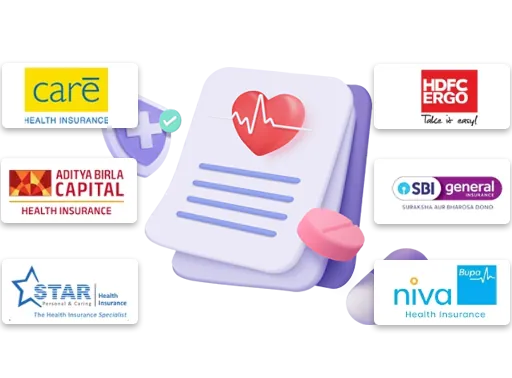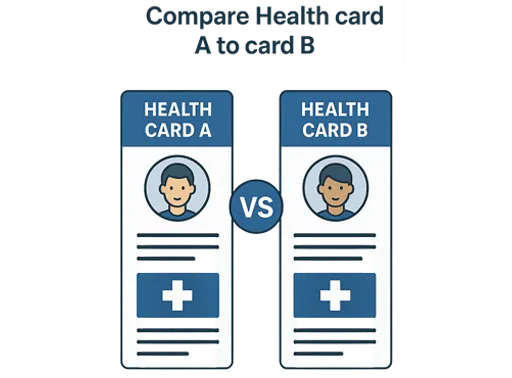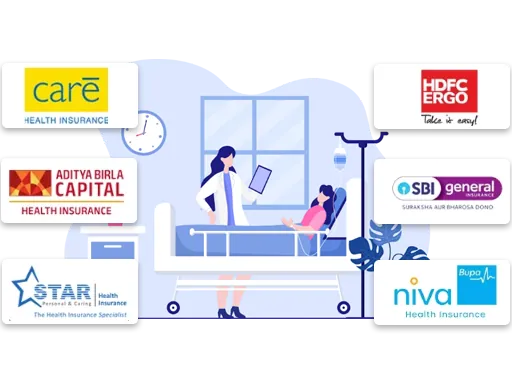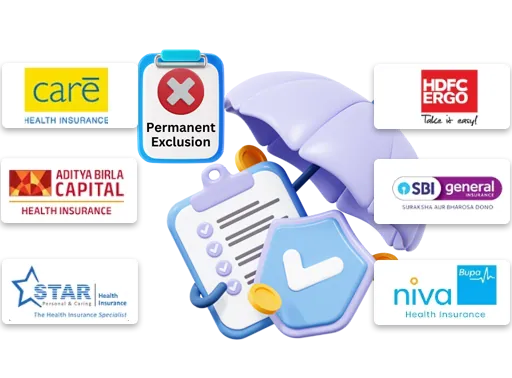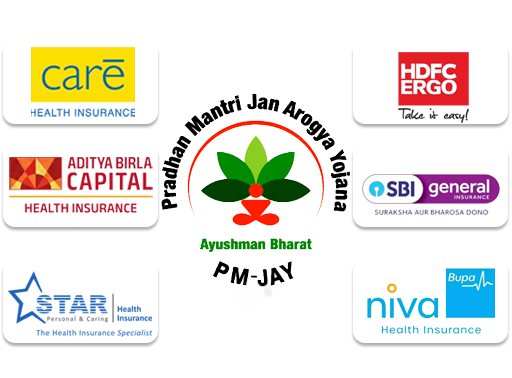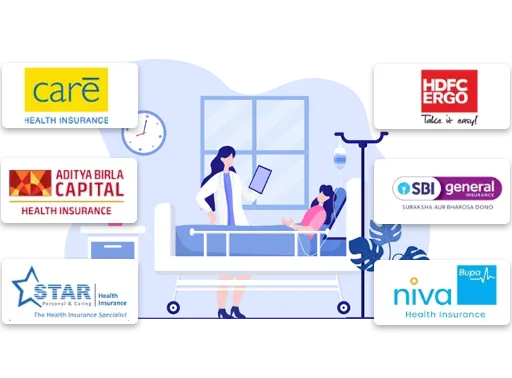Pre-Existing Diseases in Health Insurance




Simran has over 4 years of experience in content marketing, insurance, and healthcare sectors. Her motto is to make health and term insurance simple for our readers has proven to make insurance lingos simple and easy to understand by our readers.
Reviewed By:

Anchita has over 6 years of experience in content marketing, insurance, and healthcare sectors. Her motto to make health and term insurance simple for our readers has proven to make insurance lingos simple and easy to understand by our readers.
Updated on Jul 14, 2025 10 min read
Pre-Existing Disease in Health Insurance
Pre-existing diseases are the medical conditions that have been diagnosed with or treated before purchasing a health insurance policy. These conditions can include chronic illnesses like diabetes, high blood pressure, asthma, or any other long-term health issues. If you want these diseases to be covered, you need to wait for some time, which may vary from insurer to insurer.
What are Pre-existing Diseases?
As per IRDAI, a pre-existing disease is any condition, ailment, injury, or disease diagnosed by a physician within 48 months of the policy’s effective date or reinstatement. Or any medical advice or treatment recommended by or received from a physician within 48 months of the policy’s effective date or reinstatement.
List of Pre-Existing Diseases in Health Insurance
With the advancement in medical technology, now health insurance covers pre-existing diseases too. However, it comes with certain terms-conditions and waiting periods. It is very important to understand these pre-existing diseases and conditions.
| Pre-existing Disease | Description |
| Diabetes | A chronic condition that affects blood sugar levels. Requires ongoing management and may involve medication, regular check-ups, and hospitalization. |
| Hypertension | High blood pressure, which requires long-term monitoring and medication to control. |
| Asthma | The serious respiratory condition causes breathing difficulties and wheezing. Often requires medications and occasional hospital visits. |
| Heart Diseases | Conditions like coronary artery disease, heart attacks, and cardiac surgeries. May require specialized treatments and surgeries. |
| Thyroid Disorders | Includes hypothyroidism and hyperthyroidism, which require regular medication and monitoring. |
| Arthritis | Involves joint pain, stiffness, and inflammation, often requiring ongoing medication, physiotherapy, and joint replacement surgeries. |
| Cancer | Life-threatening disease requiring comprehensive coverage for chemotherapy, radiation, surgeries, and other treatments. |
| Kidney Diseases | Chronic kidney conditions such as renal failure and dialysis, require long-term treatment and possible kidney transplants. |
| Mental Health Conditions | Includes depression, anxiety disorders, and bipolar disorder, emphasizing the importance of coverage for mental health treatments and therapies. |
Health Insurance Plans That Cover Pre-existing Diseases
| Plan Name | Waiting Period | Sum Insured |
| HDFC Ergo Optima Restore Policy | 36 months | Up to 50 L |
| Care Supreme Plan | 36 months | Up to 1 Cr |
| Care Advantage | 48 months | Up to 1 Cr |
| Star Young Star | 24 months | Up to 10 L |
| ManipalCigna Prime Active | 90 days | Up to 10 L |
To check more health insurance plans, visit our top 10 health insurance plans page.
A Common Mindset for Pre-Existing Diseases Health Insurance
The value of purchasing a comprehensive health insurance policy is underestimated by the people. They rely on the money and insurance provided by their employers. However, in today’s world, the cost of medical expenses is rising, which is not economical for you. As a result, it is recommended that you and your loved ones be covered with a suitable health insurance plan.
Does health insurance cover pre-existing diseases (PEDs) that you already have? Certainly not. That is why buying health insurance early in life is recommended. This not only ensures a lower premium but also ensures that you get better coverage because the risks of catching diseases are lower at a young age.
How to Buy a Health Plan if You Have Pre-Existing Diseases?
If you are dealing with any of the diseases mentioned above, here is how you can get yourself secured under a health insurance plan. We are sharing some tips on how you can buy a suitable health insurance plan.
Research and Compare Plans
Take the time to research and compare and look for plans that specifically cover your pre-existing condition/s and provide adequate coverage for your healthcare needs. You can also use a very convenient online tool, PolicyX Premium Calculator to easily compare various insurance plans to choose the best one for you.Pre-existing Disease Coverage
Look for health insurance policies that offer coverage for these conditions after a waiting period of 48 months, as per the latest guidelines.Full Disclosure
Be transparent about your pre-existing health condition when purchasing the policy to avoid claim rejection in the future.Long-term Impact
Insurance companies typically consider only health issues with long-term consequences as pre-existing diseases, not short-term ailments like flu or fever.Lower Waiting Period
Choose a health insurance plan with a shorter waiting period for pre-existing diseases, ensuring you can file claims sooner.Co-payment Clause
Avoid health plans that have a co-payment clause for these conditions, where you would be responsible for paying a percentage of the claim amount. Look for policies without this clause.Network of Healthcare Providers
Check if the health insurance plan has a network of healthcare providers that includes specialists or hospitals relevant to your pre-existing condition. Having access to preferred healthcare providers can be beneficial for managing your condition effectively.Read Customer Reviews
Look for reviews from existing policyholders as their experiences can give you valuable insights into how well the insurance plan covers and supports individuals with similar health concerns.Consider Additional Benefits
Look for additional benefits as these may include coverage for specialized treatments, prescription medications, or preventive services that can support your overall health.Review Annual Renewal Options
Check if the health insurance plan allows annual renewals without penalties or additional waiting periods for pre-existing conditions. This ensures that you can continue receiving coverage for your condition without any interruption.
How Does Pre-existing Disease Impact Your Health Insurance Coverage?
Pre-existing diseases can impact your health insurance in different ways. Have a look below to understand better:
Higher Premiums:
Insurance companies assess risk. If you have pre-existing conditions, they may consider you a higher risk and charge higher premiums to compensate for the potential costs associated with your medical history.Waiting Periods:
Most health insurance policies have waiting periods for pre-existing conditions. This means there’s a period (usually 2-4 years) before the policy will cover expenses related to those conditions.Limited Coverage:
Some policies may have limitations on coverage for pre-existing conditions, such as lower sub-limits or exclusions for certain treatments.Claim Denials:
If you don’t disclose pre-existing conditions during the application process, your insurance claims related to those conditions may be denied. This could leave you responsible for significant medical expenses.
Why is it Important to Declare Pre-existing Disease?
You might be asking whether it’s even necessary to disclose your pre-existing disease. However, in this circumstance, it’s preferable to be completely transparent. Examine your medical records to be sure you’ve covered all of the illnesses and treatments you’ll require. If you do not disclose your pre-existing disease to the insurance company and in case they discover it later, they will reject your claim. So, rather than not declaring your PED, it’s preferable to wait for a time (PEDs waiting period) and get it covered. Here are some reasons why you need to declare pre-existing diseases beforehand:
Accurate Risk Assessment:
Insurance companies assess risk to determine premiums and coverage. Pre-existing conditions significantly impact this assessment, ensuring you pay a fair premium for your risk level.Avoid Policy Cancellation:
Non-disclosure can lead to policy cancellation if the insurer discovers the undisclosed condition. This leaves you without coverage and may affect future insurability.Tailored Coverage:
Declaring pre-existing conditions allows the insurer to offer tailored coverage options that may include exclusions or waiting periods for specific treatments.Smooth Claim Settlements:
Timely and accurate claim settlements are more likely when pre-existing conditions are disclosed upfront. This prevents disputes and delays in receiving benefits or worse, claim rejection!Building Trust:
Transparency builds trust between you and the insurer, ensuring a smoother and more reliable insurance experience.Expert POV:
While it may seem tempting to hide pre-existing conditions to avoid higher premiums or waiting periods, the risks of non-disclosure far outweigh the benefits. It’s always best to be honest and upfront with your insurer to ensure you have the right coverage and protection when you need it most.
Effects of a Pre-existing Disease on Your Health Insurance
The following is a list of the possible effects of having a pre-existing disease on your health insurance policy.
Premium Loading:
The premium will be on the higher side because the insurance provider is taking the risk of covering a pre-existing condition. This premium loading is only applicable at the time of insurance purchase. It cannot be charged again if the policy is renewed without interruption.Waiting Period:
This is the time frame for which you must wait for your pre-existing diseases to be covered by your insurance policy and it depends on the insurance provider who is providing the policy.Premium Loading + Waiting Period:
In some cases where you will be charged a higher premium and have a long waiting period before covering an illness.Medical Check-up:
If you have a pre-existing disease, your insurance company may require you to undergo a medical examination. The insurance premium will be based on the results of the tests. If the results are unfavourable, the insurance company may refuse to offer a policy.Permanent Exclusions:
The insurance provider may refuse to cover you If you have a pre-existing disease. You have to agree that the mentioned pre-existing disease in the policy agreement is a permanent exclusion in the policy. By doing this, you will be uninsured against your pre-existing diseases, & will be covered for other health scenarios if the policy’s terms and conditions are met.Policy Denial:
The insurance company has the right to refuse to offer you the policy because of pre-existing diseases. They will deny your application to buy a health insurance policy in such instances.
How to Buy Health Insurance for Parents Who Have a Pre-Existing Illness?
Parents who turn 60 years old need a health insurance policy. Senior citizens are more prone to diseases. Also, it is inevitable to avoid health ailments as they grow older. When you are buying a policy for your parents, disclose all the diseases they are having. This is how you will get a suitable plan at the best cost. Also, there will be no fear of claim rejection when in need.
To buy a health insurance plan for pre-existing diseases, you can contact PolicyX.com. We offer free quotes and expert advice. Call us at 1800-4200-269. Here you will get only experts who can guide you towards a safe future.
Do’s and Don’ts in Case of Pre-existing Diseases
Do Share Information About Pre-existing Diseases With Insurer:
When communicating with the insurance company, be open and honest. If the insurer asks you about your medical history, be honest.Do Get A Check-up:
Getting a health check-up on your own is a smart idea. It will notify you if you have any existing diseases and will assist you in taking appropriate action.Don’t hide Information:
Be open and honest with your insurer. Don’t hide any information about your medical history.Don’t Fail To Compare Plans Before Buying:
If an insurance company refuses to sell you a policy or charges you a high premium to cover a pre-existing disease, you can do some online research and look into alternatives.
Things You Should Know About Pre-existing Conditions
Here are a few key factors to remember about pre-existing conditions and health insurance.
Different Insurers Have Different Policies:
When it comes to pre-existing diseases, not all companies follow the same set of rules. Some insurers may cover pre-existing diseases, while some may not. Some may have a shorter waiting period, while others may have a longer waiting period. Therefore, before buying the plan, read carefully the terms & conditions.Every Doctor Visit is Not Counted:
Common colds and coughs will not count as a pre-existing disease. It’s not a problem to go to the doctor to get your headache treated. However, if you’ve had the headache for a year and are taking medicine, you may have pre-existing diseases.Hiding A Pre-existing Disease:
To avoid hassles during claim settlement, it’s preferable, to be honest, and transparent with the insurance company about pre-existing conditions.Non-disclosure May Result in Claim Rejection:
Non-disclosure of a pre-existing condition can result in policy cancellation or dishonouring of claims for such diseases. Claim rejection can be disturbing for you at the time of need. So, always disclose your PEDs to your insurance provider and always be honest with them.
The Bottom Line
Pre-existing diseases can significantly impact your health insurance coverage, but being upfront and honest with your insurer is crucial. Disclosing pre-existing conditions ensures accurate risk assessment, and tailored coverage, avoids policy cancellation, and facilitates smoother claim settlements. Remember, transparency builds trust and leads to a more reliable insurance experience. If you’re considering buying health insurance and have pre-existing conditions, don’t hesitate to contact PolicyX. We can help you compare plans, understand waiting periods, and find the coverage that best meets your needs, without any gimmicks.
Consult for Personalized Insurance Advice

But how does it work?
Schedule a call with India’s number 1 trusted advisor with a 4.5+ rating on Google. We are not your average insurance agents. Our advisors are experts in their insurance knowledge and will give you the right information at the right time. The service is free of cost! Don’t worry, we won’t spam as we value your time.
Health Insurer Network Hospitals
Pre-Existing Diseases in Health Insurance: FAQs
1. What are pre-existing diseases in health insurance?
Pre-existing diseases are any medical conditions that you were diagnosed with or treated for before purchasing a health insurance policy. This includes conditions like diabetes, high blood pressure, asthma, heart disease, and more.
2. Why is it important to declare pre-existing diseases?
It is important to declare pre-existing diseases before buying a health insurance policy for risk assessment. Non-disclosure can lead to policy cancellation if the insurer discovers the condition later.
3. What happens if I don’t declare a pre-existing disease?
If you do not declare a pre-existing disease, then the claims related to the undisclosed condition may be denied.
4. Can I get health insurance if I have pre-existing diseases?
Yes, you can still get health insurance. However, it may have higher premiums, longer waiting periods or limitations on coverage for those conditions.
5. How can I find a health insurance plan that covers pre-existing diseases?
Research and compare different plans, looking for those that offer coverage for your specific conditions. Consider the plans with shorter waiting periods or those that offer more comprehensive coverage for pre-existing diseases.
6. What is the waiting period for pre-existing diseases?
Pre-existing illnesses/conditions or symptoms would be covered after the completion of 36 months waiting period from the commencement date of the first Health Infinity Policy.
Health Insurance Companies
Know More About Health Insurance Companies
